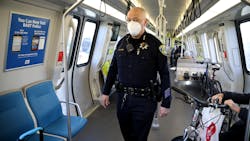BART Police chief shares how to build a progressive policing presence
Bay Area Rapid Transit (BART) Police Chief Ed Alvarez reflected on his first year as BART’s police chief, sharing how he aimed to create a progressive police department.
“I want to build the most progressive police department in America,” Alvarez said, of the just under 400 personnel under his watch. “Not just the most progressive transit police department—the most of any police department.”
Alvarez joined BPD almost a quarter-century ago. It was his first job in law enforcement and he has served his whole career at BART, working his way up through the ranks and making deep connections to the community.
He was appointed as chief on Jan. 1, 2020, and sworn in on Feb. 7, 2020, in a ceremony with blue and gold balloons, sheet cake, handshakes and hugs, just one month before the coronavirus was declared a pandemic. His long years of experience gave Alvarez the insights to quickly implement many strategic initiatives that already have paid off, with more on the way.
Notably, Alvarez created a new Bureau of Progressive Policing and Community Engagement that is an umbrella over a growing team of non-armed personnel that includes the award-winning transit ambassadors and soon will include an additional 20 crisis intervention specialists. They’ll focus on connecting those experiencing homelessness, mental illness and substance abuse with services.
The bureau also will include 10 police officers who will receive specialized training.
“We’re infusing 40 additional bodies into our system,” Alvarez said. “These are people who are providing presence, resources, who are extra eyes and ears. We’re going to have more presence than we’ve ever had at BART.”
BART Police also have prioritized making it easy to contact them; there is the BART Watch app to communicate in real-time with dispatch as well as a direct text-BPD line.
Deputy Chief Angela Averiett, who leads the new Bureau of Progressive Policing, says Alvarez has been a steady hand in a time of great change.
“I think the chief’s leadership is a reflection of the resilience of this organization,” she said. “Through all the major challenges of the past year, he has led us courageously and transparently and kept us focused on the mission. His creating this bureau speaks to his very forward-thinking way of how law enforcement needs to change and adapt, how we need to make meaningful reforms.”
The pandemic and associated economic misery has exacerbated homelessness, stressed an already-fractured patchwork of services, and has exposed disparities in health, safety and other outcomes along race and class lines, says BART.
Additionally, the killing of George Floyd by a Minneapolis police officer in May 2020 drew worldwide attention and built a movement demanding more accountability from law enforcement. Alvarez says he was appalled by the abuse of power “and the arrogance” in the Minnesota case – and that he conveys that message to BPD personnel.
“We have to earn the public’s trust every day,” Alvarez said. “We can’t take their trust for granted. We have to do better.”
“It shouldn’t have happened,” Alvarez has said of Floyd’s death. “And a lot of departments are changing how they operate because of it, because of him and the other individuals before and after him. It’s been a call to action.”
BART says he’s committed to meeting the moment by increasing training, including the innovative ICAT, or Integrating Communications, Assessment and Tactics course. ICAT is designed especially for situations involving people who are unarmed or armed with weapons other than firearms, and who may be experiencing a mental health or other crisis.
Alvarez also has prioritized working collaboratively with the Citizen Review Board and the Office of the Independent Police Auditor, two civilian oversight bodies that provide another layer of police accountability at BART.
“We all have the same goal of making sure BART is safe for the riding public and our employees,” Alvarez said.
As a first-generation immigrant, Alvarez says he is keenly aware of the issues of mistrust that arise when there are disparate impacts from policing, and that BART is not immune from them.
“We need to be treating all people fairly and equitably,” he said. “That is my expectation for everyone at BPD. We are here to protect and serve. We will continue to work on building bridges and engaging with the communities we serve."
